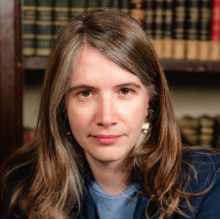Let’s talk about you: what is your background, what do you teach, and what are your research interests?
My name is Giulia Delogu, I am originally from Piacenza, and I trained at the Ghislieri College in Pavia. At Ca' Foscari I am a professor of Modern History and teach Population History and History of Global Relations at PISE, and Global History at RIC. I am currently working on Mediterranean and Atlantic free ports in the Modern Age. So far, they have been studied mainly as economic institutions, yet they were so much more: responses to the climate crisis of the Little Ice Age and true laboratories of modernity. I generally believe that the Modern Age continues to be an important field of study, being the time when the foundations for present-day societies are laid. Without understanding the roots, it becomes difficult to even imagine future developments.
Tell us about your academic path.
I studied at the University of Pavia, as an alumna of the Ghislieri College, a college of excellence founded in 1567, where every stone and step (there are many stairs!) oozes history, and where, in order to stay, you have to forge ahead, always completing exams by the fall and with an average mark of 27. Studying and living in such an environment greatly inspired me and provided me with huge opportunities for human and intellectual growth: from Ghislieri I landed at the Ecole Normale Superieure in Paris, then in Trieste for a PhD and at Stanford University.
What are your professional role models / references?
Across the different stages of my education and career, I have been fortunate to encounter many role models to follow and counter-models to avoid (you learn a lot by contrast as well!). Each has left me something that helped me over time. But I had my first role model at home: my father, an agricultural scientist who passed away too early, who taught me that in the research profession, as in everything, you need a mix of talent, passion and a lot of sense of duty and service to others.
Have you always known that this was going to be your path?
No, I started college with the idea of becoming a high school teacher. At Pavia, I discovered the world of humanities research and was fascinated by it. Later, the many difficulties related to the precariousness of academic paths led me to doubt my choices. At a time of crisis, when I seriously considered changing my path, a professor from Pavia, whom I asked whether to persevere with academia or not, told me that was an answer only I could give myself. And to do that I had to think about whether when I was researching and writing I was happy. I gave myself that answer and continued. This answer was also confirmed when I found myself in the classroom teaching. Now I would never want to do another profession.
What does teaching and researching mean to you?
Teaching and doing research are the two inseparable sides of our jobs as academics: without one, there is no other. Research is dealing with the complexity of reality, analysing the traces of the past to build knowledge and models still useful today. Teaching is not just to pass on this knowledge, but to test it and rebuild it even more firmly, through discussion with students.
What has given you the greatest satisfaction in your career?
Those that are yet to come. Ours is a profession based on dialogue (with students and colleagues) and questioning certainties, so it is necessary to keep an open mind and never consider oneself accomplished.
What study area have you always wanted to be involved in, but have not yet had the opportunity to explore?
For years I have dreamed of studying the figure of Napoleon. So far, I have always done it only in my spare time and would like to devote myself to it thoroughly instead. To understand how and why, already in his lifetime, and still today, he was and remains a global celebrity. Understanding the celebrity of figures such as Napoleon is not just an erudite divertissement for me, but a useful key to understanding also today's politics and information.
What would you say to young people starting their university career?
To take the time to find their way (but not too much!) and once they find it, put their best effort into it. The university is like a gymnasium for what comes next. It should be experienced fully, not limited to classes and exams: it offers so many opportunities for human and intellectual growth that should not be missed.
What would you say to young researchers?
That research is not a pastime, but a job, and should be understood as such starting right from the PhD. And to jump in fearlessly right away, cultivating ideas and projects: reading, writing, publishing, going to conferences. The more experience the better, especially internationally.
Why Ca’ Foscari and Venice?
Coincidentally, in 2015, having returned from the United States, I participated in a call for a research grant, without particularly believing in it and without having ever set foot at Ca' Foscari before then. I remember arriving in Venice the day before my interview thinking: "At least I will visit Burano", which I had never seen and was very fascinated by. Instead, against all my expectations, it went well and I discovered a dynamic and open university where I wanted to stay.

